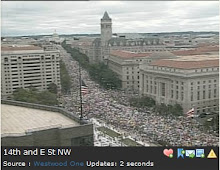The Morning Bell
THURSDAY, OCT 29, 2009
The Cap and Trade Threat to Our National Security
In poll, after poll, after poll, the American people have clearly expressed their preference for prioritizing economic growth over global warming. This is a major problem for those on the left who want to reorganize our entire economy under the guise of cap and trade climate change legislation. Tacitly admitting they have lost this argument, the left has shifted gears and is trying a new tack: global warming is a threat to national security. So Sen. John Kerry (D-MA) recently blogged at the Center for American Progress:
[C]limate change injects a major new source of chaos, tension, and human insecurity into an already volatile world. It threatens to bring more famine and drought, worse pandemics, more natural disasters, more resource scarcity, and human displacement on a staggering scale. We risk fanning the flames of failed-statism, and offering glaring opportunities to the worst actors in our international system. In an interconnected world, that endangers all of us.
Kerry is 100% wrong. Heritage fellow Lieutenant Colonel James Jay Carafano (Ret.) explained why in his testimony before the Senate’s Environment and Public Works Committee yesterday:
Climate Change is a Permanent Feature of Human Reality: While it might feel intuitively appropriate to directly connect the dots between the changing global environment and the human response to global warming, an appropriate complex system analysis would warn against such an approach. Indeed, there are many variables other the climate that affect how humans respond to climate change and, in turn, alter their behaviors to try to impact climate change and its consequences. For example, while the emission of greenhouse gases has been increasing across the globe for the last decade, political violence has been in decline. Furthermore, any changes in the climate, for better or for worse, will occur gradually over decades. Thus, there will be ample time to adjust national security and humanitarian assistance instruments to accommodate future demands. The global climate has always been changing. Adapting to these changes and human efforts to manage their surrounding environment is a permanent feature of human competition. The environment does not cause wars; it is how humans respond to their environment that causes conflicts.
Cap and Trade Would Do Nothing to Stop Climate Change: Even if you assume climate change is a threat to national security, proponents of cap and trade must first show that their solution would actually solve the problem. They can’t. According to climatologist Chip Knappenberger, similar legislation proposed in the House would moderate temperatures by only hundredths of a degree after being in effect for the next 40 years and no more than two-tenths of a degree at the end of the century. EPA Administrator Lisa Jackson concurred, recently saying, “US action alone will not impact world CO2 levels.”
Cap and Trade Would Cripple the U.S. Economy: While there is no evidence that cap and trade legislation will halt climate change, there is strong evidence it will hurt the U.S. economy. A study by The Heritage Foundation’s Center for Data Analysis on a similar companion bill proposed in the House finds that the law would make the United States about $9.4 trillion poorer by 2035. Much of this decline would be from reduced economic productivity and job loss. In particular, under the House legislation there would be 1.15 million fewer jobs on average than without a cap-and-trade bill. A collapse in U.S. economic growth would result in even more draconian cuts to the defense budget, leaving America with a military much less prepared to deal with future threats. Indeed, if America’s military power declines, there would probably be more wars, not fewer.
Inflicting cap and trade on the U.S. economy may well create the world we want to avoid. The law would ensure a steep decline in U.S. economic competitiveness and military preparedness. The consequences of a weak America would inevitably lead to a string of national security crises and an undermining of the nation’s capacity to deal with natural disasters here and abroad. At yesterday’s hearing, Sen. Barbara Boxer (D-CA) told Carafano she appreciated his testimony but that it was “misguided” since her cap and trade bill would create jobs, not cost them. Senator Boxer may want to read the testimony of Congressional Budget Office Director Doug Elmendorff who told Congress earlier this month that cap and trade would cause “significant” job loss and slow the U.S. economy. Our national security depends on it.
Thursday, October 29, 2009
Subscribe to:
Post Comments (Atom)
















No comments:
Post a Comment